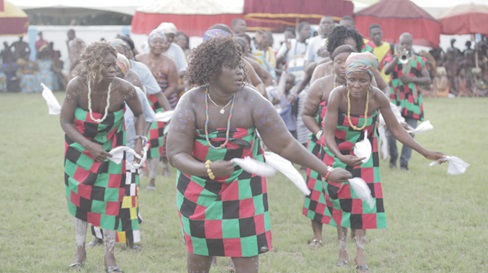
Borborbor: Legendary Ewe dance preserved over centuries
The Borborbor dance of the Ewe people is believed to be more than 800 years old.
Advertisement
The Borborbor rhythm was played as a form of entertainment after a hard day’s work on the farm and other fields of tedious labour, usually from late afternoon to the evening, before retiring to bed.
History has it that when the Ewes fled the Notsie Kingdom, they brought the cultural dance along to the various locations where they settled, especially in the present middle belt of Eweland.
Thus, Borborbor is very common in Kpando, Kpeve, Ho, Adaklu, Hohoe, Peki and other communities.
Although various Borborbor groups have different dance styles, one common feature of the dance is the vigorous and swift waist twisting sessions by the women.
The dancers could also go down on their knees and squat in some cases before getting up to wriggle their buttocks while turning round with great fervour to hold onlooker's captive.
A retired civic educator, historian and an elder of Asogli, Mr Frank Mawuko Adoba, said there was nothing pagan about Borborbor.
“This is purely cultural entertainment,” he told The Mirror in an interview in Ho on Wednesday, March 6, 2024.
He said earlier missionaries misconstrued that cultural recreational activity and excommunicated people from the church not only for dancing Borborbor but also for watching the dancers and applauding them.
Mr Adoba explained that with time, Borborbor underwent various forms of transformation to suit all occasions.
“It is played at weddings, festivals, funerals, and even graduation ceremonies at tertiary institutions and other social or national events,” he added.
Today, for instance, Borborbor dancers are seen in smart uniforms with handkerchiefs to match.
At this year’s Independence Day celebration at the Ho Jubilee Park, Borborbor dance served as the curtain raiser for the main event.
Mr Adoba said the cultural dance was also a very strong unifying tool among the people and neighbouring communities.
The loud sound of the drums and voices of the singers attracted people from other communities who usually trooped to the dance floor with great zeal and enthusiasm.
Different songs accompany the dance.
So, one could tell if it is a joyous or sorrowful occasion by listening to the songs.
Sometimes, the songs expose and shame wrongdoers in the communities, compelling them to go into exile.
The venue for Borborbor also provides a suitable ground for lovers to meet and renew their bonds of affection and loyalty through the songs and drum beats.
It is not unusual to see people leaving the Borborbor grounds late in the evening in pairs, Mr Adoba added.
He said the only occasion where Borborbor was forbidden was when local townsmen returned from the battlefield.
When blood was split, there was no need for entertainment for some time in the community, he told The Mirror.
Mr Adoba said as a result of the transformations Borborbor had gone through, it was now played in churches to the great pleasure of worshippers.
“Other ethnic groups have also welcomed Borborbor as a traditional Ewe dance,” he said.
Mr Adoba who is also a retired Volta Regional Director of the National Commission of Civic Education (NCCE) maintained that Borborbor was a very Godly dance which did not discriminate against any tribe, social status, or religious groups.
“This is why we see pastors nowadays dancing Borborbor in church and at various social events,” he observed.
At funerals, Borborbor is played to dry the tears of mourners, at weddings and birthday parties, it adds to the ecstasy.
Borborbor is played when a new chief is being introduced and when an old chief is being seen off to his village, with the appropriate drum beats and songs.
Mr Adoba insisted the dance was a rich aspect of the culture of the Ewe people and must, therefore, be preserved and promoted to benefit generations yet unborn.
He said the venue for the dance also offered an appropriate ground for talent hunt where drummers, singers and dancers were usually discovered.




